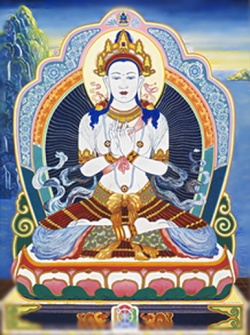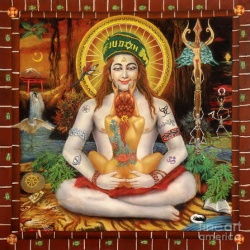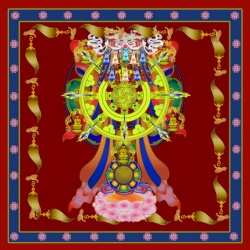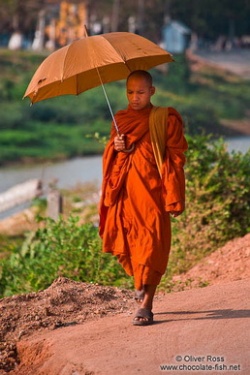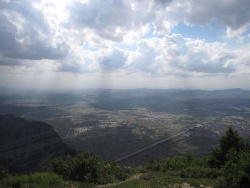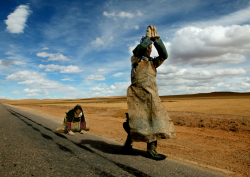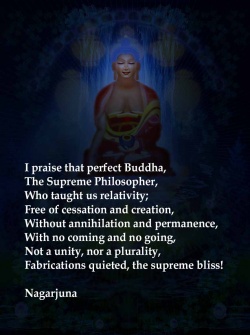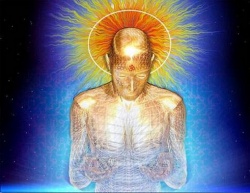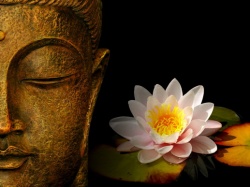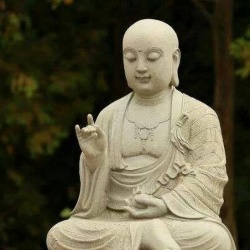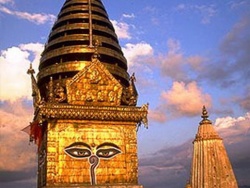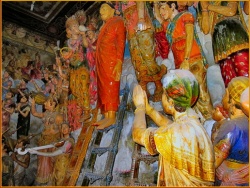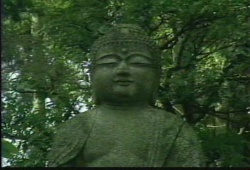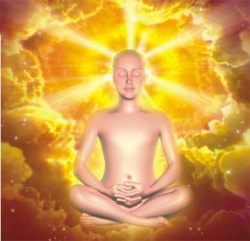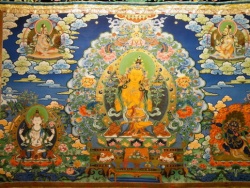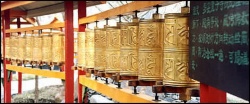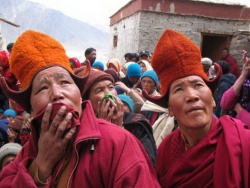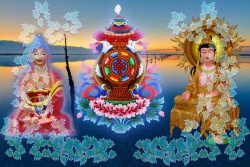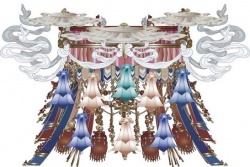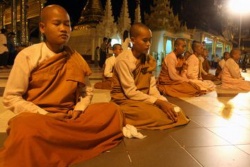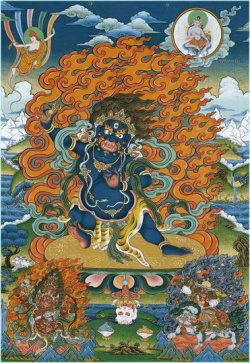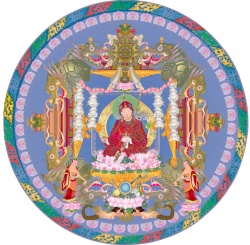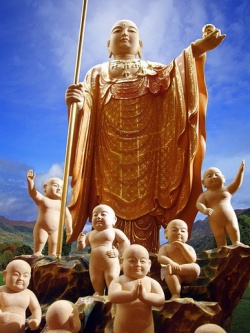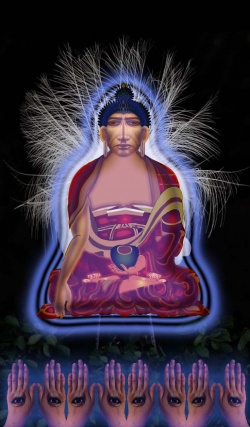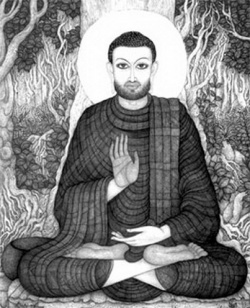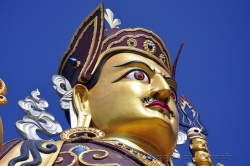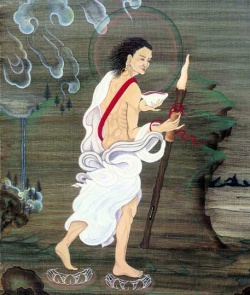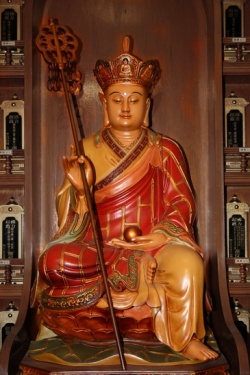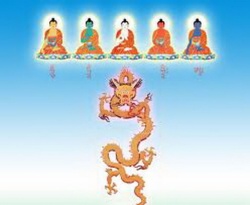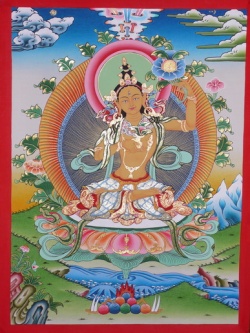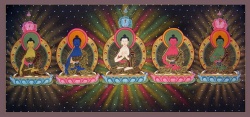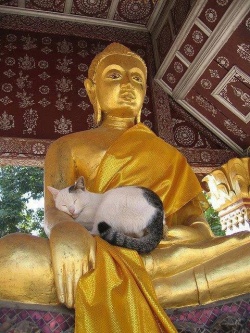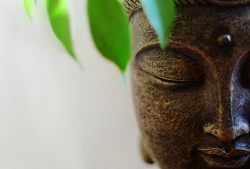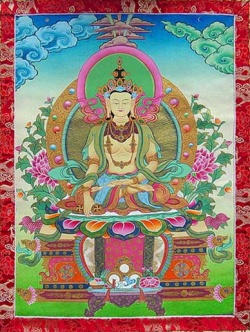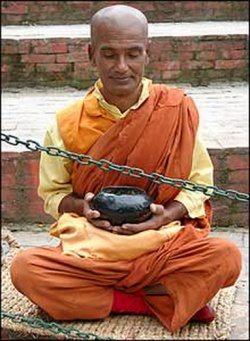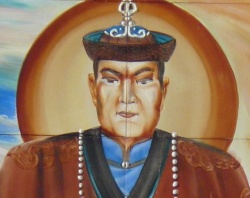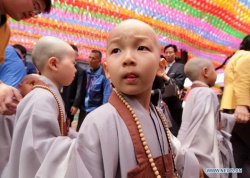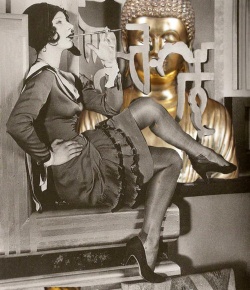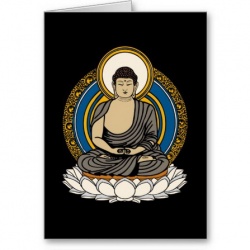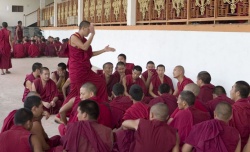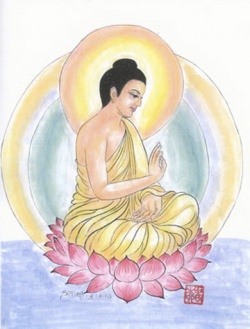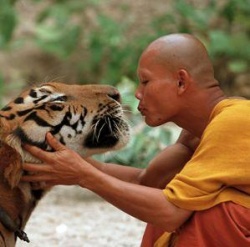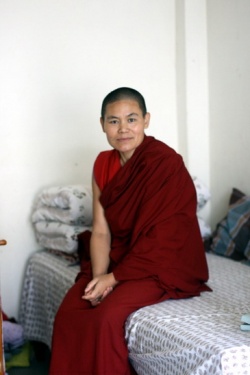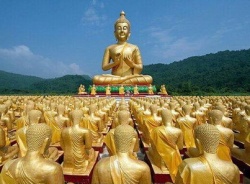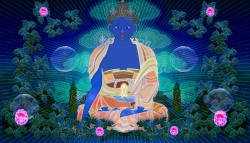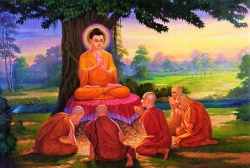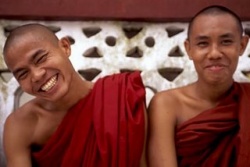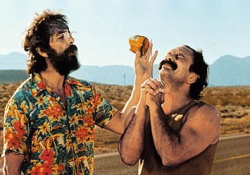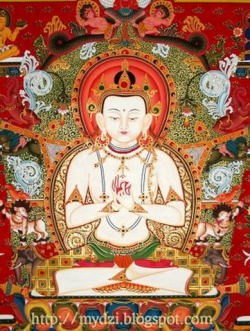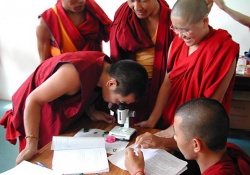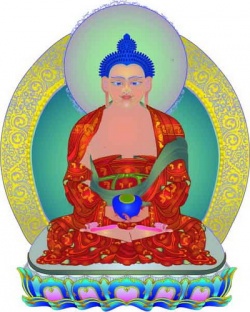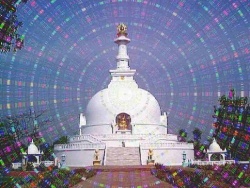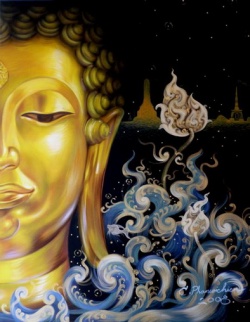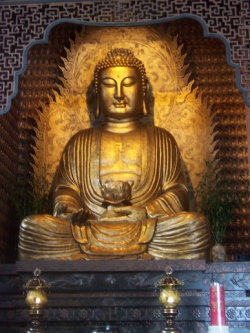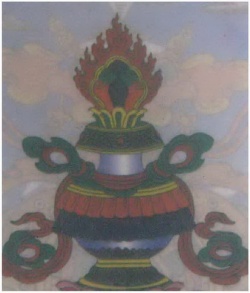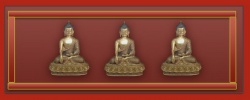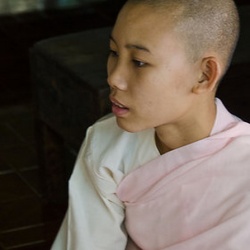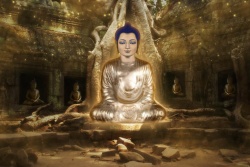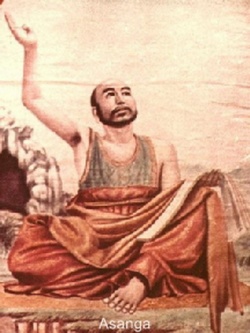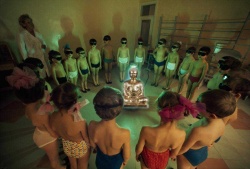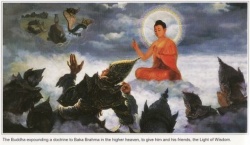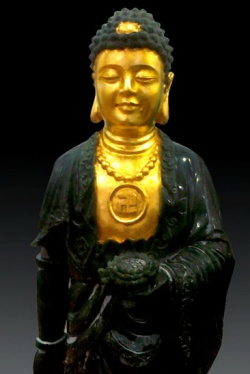Second Khandhaka
Second Khandhaka.
(The Uposatha Ceremony, and the Pātimokkha.)
1.
1. At that time the Blessed Buddha dwelt near Rājagaha, on the Gigghakūṭa mountain (`the vulture's peak'). At that time the paribbājakas belonging to titthiya schools assembled or the fourteenth, fifteenth, and eighth day of each half month[1] and recited their Dhamma. The people went to them in order to hear the Dhamma. They were filled with favour towards, and were filled with faith in the paribbājakas belonging to titthiya schools; the paribbājakas belonging to titthiya schools gained adherents.
2. Now when the Magadha King Seniya Bimbisāra was alone, and had retired into solitude, the following consideration presented itself to his mind: `The paribbājakas belonging to titthiya schools assemble now on the fourteenth, fifteenth, and eighth day of each half month and recite their Dhamma. The people go to them in order to hear the Dhamma. They are filled with favour towards, and are filled with faith in, the paribbājakas who belong to titthiya schools; the paribbājakas who belong to titthiya schools gain adherents. What if the Reverend ones (the Buddhist bhikkhus) were to assemble also on the fourteenth, fifteenth, and eighth day of each half month.'
3. Then the Magadha King Seniya Bimbisāra went to the place where the Blessed One was; having approached Him and having respectfully saluted the Blessed One, he sat down near Him. Sitting near Him the Magadha King Seniya Bimbisāra said to the Blessed One: `Lord, when I was alone and had retired into solitude the following, consideration presented itself to my mind: "The paribbājakas, &c.; what if the Reverend ones were to assemble also on the fourteenth, fifteenth, and eighth day of each half month." Well, Lord, let the Reverend ones assemble also on the fourteenth, fifteenth, and eighth day of each half month.'
4. Then the Blessed One taught, incited, animated, and gladdened the Magadha King Seniya Bimbisāra by religious discourse; and the Magadha King Seniya Bimbisāra, having been taught . . . and gladdened by the Blessed One by religious discourse, rose from his seat, respectfully saluted the Blessed One, passed round Him with his right side towards Him, and went away.
In consequence of that and on this occasion the Blessed One, after having delivered a religious discourse, thus addressed the bhikkhus: `I prescribe, O bhikkhus, that you assemble on the fourteenth, fifteenth, and eighth day of each month.
______________________
2.
At that time the bhikkhus, considering that the Blessed One had ordered them to assemble on the fourteenth &c. day of each half month, assembled on the fourteenth &c. day of each half month and sat there silent. The people went to them in order to hear the dhamma. They were annoyed, murmured, and became angry: `How can the Sakyaputtiya samaṇas, when they have assembled on the fourteenth &c. day of each half month, sit there silent, like the dumb, or like hogs? Ought they not, to recite the Dhamma, when they have assembled?' Some bhikkhus heard those people that were annoyed, murmured, and had become angry; these bhikkhus told this thing to the Blessed One. In consequence of that and on this occasion the Blessed One, after having delivered a religious discourse, thus addressed the bhikkhus: `I prescribe, O bhikkhus, that you recite the Dhamma, when you have assembled on the fourteenth &c. day of each half month.'
______________________
3.
1. Now when the Blessed One was alone and had retired into solitude, the following consideration presented itself to His mind: `What if I were to prescribe that the bhikkhus recite as the Pātimokkha[2] the precepts which I have promulgated to them; this will be their Uposatha service (service of the fast-day).'
2. And the Blessed One, having left the solitude in the evening, in consequence of that and on this occasion, after having delivered a religious discourse, thus addressed the bhikkhus: `When I was alone, O bhikkhus, and had retired into solitude, the following consideration, &c., This will be their Uposatha service. I prescribe you, O bhikkhus, to recite the Pātimokkha.
3. `And you ought, O bhikkhus, to recite it in this way: let a learned, competent bhikkhu proclaim the following ¤atti before the saṅgha : "Let the saṅgha, Reverend Sirs, hear me. Today it is Uposatha, the fifteenth (of the half month). If the saṅgha is ready, let the saṅgha hold the Uposatha service and recite the Pātimokkha. What ought to be first done by the saṅgha? Proclaim the pārisuddhi[3], Sirs, I will recite the Pātimokkha."
`"We hear it well and fix well the mind on it all of us[4]."
`"He who has committed an offence, may confess it; if there is no offence, you should remain silent; from your being silent I shall understand that the Reverend brethren are pure (from offences). As a single person that has been asked a question, answers it, the same is the matter if before an assembly like this a question has been solemnly proclaimed three times: if a bhikkhu, after a threefold proclamation, does not confess an existing offence which he remembers, he commits an intentional falsehood. Now, Reverend brethren, an intentional falsehood has been declared an impediment[5] by the Blessed One. Therefore, by a bhikkhu who has committed (an offence), and remembers it, and desires to become pure, an existing offence should be confessed; for if it has been confessed, it is treated duly."'
4.[6] `Pātimokkhaṃ:' it is the beginning, it is the face (mukham), it is the principal (pamukham) of good qualities; therefore it is called `Pātimokkhaṃ[7].'
`Āyasmanto:' this word `āyasmanto' is an expression of friendliness, an expression of respect, an appellation that infers respectfulness and reverence.
`Uddisissāmi:' I will pronounce, I will show, I will proclaim, I will establish, I will unveil, I will distinguish, I will make evident, I will declare.
` Tam' (it): this refers to the Pātimokkha.
`Sabbe va santā' (all of us): as many as are present in that assembly, aged, young, and middle-aged (bhikkhus), are denoted by `sabbe va santā[8].'
`Sādhukaṃ suṇoma' (we hear it well): admitting its authority, fixing our minds on it, we repeat the whole of it in our thoughts.
`Manasikaroma' (we fix our minds on it) : we listen to it with concentrated, not perplexed, not confused thoughts.
5. `Yassa siyā āpatti' (he who has committed an offence): he who, whether an aged or young or middle-aged bhikkhu, has committed some offence belonging to the five classes of offences or to the seven classes of offences[9].
`So āvikareyya:' he may show it, unveil it, make it evident, declare it before the saṅgha (the full chapter of bhikkhus), or before a small number, or before one person.
`Asanti āpatti' (a non-existing offence): an offence which has not been committed, or which has been committed and atoned for.
`Tuṇhi bhavitabbam' (he ought to remain silent): he ought to accept (the recitation of the Pātimokkha without any answer), he ought not to utter anything.
`Parisuddhā'ti vedissāmi'(I shall understand that they are pure): I shall infer, I shall know.
6. `Yathā kho pana paccekaputthassa veyyākaranam hoti'(as a single person that has been asked a question answers it) : as a single person that has been asked a question by another one, would answer it, thus (those who are present) in that assembly ought to understand: `He asks me.'
`Evarūtpā parisā' (an assembly like this): this refers to the assembly of bhikkhus.
`Yāvatatiyam anussāvitam hoti' (it has been solemnly proclaimed three times): it has been solemnly proclaimed once, and the second time, and the third time.
`Saramāno' (remembering it): knowing it, being conscious of it.
`Santi āpatti' (an existing offence): an offence which has been committed, or which has been committed and not been atoned for.
`Nāvikareyya:' he does not show it, he does not unveil it, he does not make it evident, he does not declare it before the saṅgha, or before a small chapter, or before one person.
7. `Sampajānamusāvād' assa hoti' (he commits an intentional falsehood): what is intentional falsehood? It is a sin[10].
`Antarāyiko dhammo vutto Bhagavatā'(it has been declared an impediment by the Blessed One): an impediment to what? An impediment to the attainment of the first jhāna, an impediment to the attainment of the second third fourth jhāna, an impediment to the attainment of the jhānas, vimokkhas[11], samādhis (states of self-concentration), samāpattis (the eight attainments of the four jhānas and four of the eight vimokkhas), the states of renunciation, of escape (from the world), of seclusion, of (all) good qualities.
` Tasmā :' for that reason.
`Saramānena' (by him who remembers it): by him who knows it and is conscious of it.
`Visuddhāpekkhena' (by him who desires to become pure): by him who wishes to atone for it and to make himself pure of it.
8. `Santa āpatti' . . . (see sect.6).
`Avikātabbā' (it is to be confessed): it is to be confessed before the saṅgha or before a small chapter, or before one person.
`Avikatā hi'ssa phāsu hoti' (for if it has been confessed, it is treated duly): duly for what purpose? In the due way for the attainment of the first jhāna (and so on, as in sect.7, down to) of (all) good qualities.'
______________________
4.
1. At that time the bhikkhus, considering that the Pātimokkha recitation had been instituted by the Blessed One, recited the Pātimokkha every day.
They told this thing to the Blessed One.
`The Pātimokkha, O bhikkhus, is not to be recited every day. He who recites it (every day), commits a dukkaṭa offence. I ordain, O bhikkhus, to recite the Pātimokkha on the Uposatha day.'
2. At that time the bhikkhus, considering that it had been prescribed by the Blessed One to recite the Pātimokkha on the Uposatha, day, recited the Pātimokkha three times each half month, on the fourteenth, fifteenth, and eighth day of each half month.
They told this thing to the Blessed One.
`The Pātimokkha, O bhikkhus, is not to be recited three times each half month. He who recites it (three times), commits a dukkaṭa offence. I prescribe, O bhikkhus, that you recite the Pātimokkha once each half month, on the fourteenth or on the fifteenth day.'
______________________
5.
1. At that time the chabbaggiyā bhikkhus recited the Pātimokkha according as they lived together, every one before his own companions.
They told this thing to the Blessed One.
`The Pātimokkha, O bhikkhus, is not to be recited according as (the bhikkhus) live together, by every one before his own companions. He who recites it (in that way), commits a dukkaṭa offence. I prescribe, O bhikkhus, that the Uposatha service is to be held by the complete fraternity.'
2. Now the bhikkhus thought: `The Blessed One has prescribed that the Uposatha service is to be held by the complete fraternity. How far does completeness extend, as far as one residence (or one district), or all over the earth?'
They told this thing to the Blessed One.
`I prescribe, O bhikkhus, that completeness is to extend as far as one residence.'
3. At that time the Reverend Mahā Kappina dwelt near Rājagaha, in, the deer park of Maddakukkhi. Now (one day) when the Reverend Mahā Kappina was alone and had retired into solitude, the following consideration presented itself to his mind: `Shall I go to the Uposatha service or shall I not go? Shall I go to the functions of the order or shall I not go? Indeed I have become pure by the highest purity (i.e. I have reached arahatship or Nirvāna).'
4. Then the Blessed One, understanding by the power of His mind the reflection which had arisen in Mahā Kappina's mind, disappeared from the Gigghakuta mountain and appeared in the deer park of Maddakukkhi, before the Reverend Mahā Kappina (as quickly) as a strong man might stretch his bent arm out, or draw his outstretched arm back. The Blessed One sat down on a seat laid out for Him, and the Reverend Mahā Kappina, after having respectfully saluted the Blessed One, sat down also near Him.
5. When the Reverend Mahā Kappina was seated near Him, the Blessed One said to him: `When you were alone, Kappina, and had retired into solitude, has not the following consideration presented itself to your mind: "Shall I go (&c., as in sect.3 down to:) by the highest purity?"'
`Even so, Lord.'
`If you brāhmaṇas do not honour, do not regard, do not revere, do not pay reverence to the Uposatha, who will then honour, regard, revere, pay reverence to the Uposatha? Go to the Uposatha, O brāhmaṇa, do not neglect to go; go to the functions of the order, do not neglect to go.' The Reverend Mahā Kappina promised the Blessed One to do so (by saying), `Even so, Lord.'
6. Then, having taught, incited, animated, and gladdened the Reverend Mahā Kappina by a religious discourse, the Blessed One disappeared from the deer park of Maddakukkhi, from the presence of the Reverend Mahā Kappina, and appeared on the Gigghakūṭa mountain (as quickly) as a strong man might stretch his bent arm out, or draw his outstretched arm back.
______________________
6.
Now the bhikkhus thought: `The Blessed One has prescribed that completeness (of the assembled fraternity) is to extend as far as one residence[12]. Now how far does one residence extend?'
They told this thing to the Blessed One.
I prescribe, O bhikkhus, that you determine a boundary. And it ought to be determined, O bhikkhus, in this way: first the landmarks are to be proclaimed: a landmark consisting in a mountain, in a rock, in a wood, in a tree, in a path, in an anthill, in a river in a piece of water. The landmarks having been proclaimed, let a learned competent bhikkhu proclaim the following ¤atti before the saṅgha: "Let the saṅgha, Reverend Sirs, hear me. If the saṅgha is ready, let the saṅgha, as the landmarks have been proclaimed all around, by these landmarks determine the boundary for common residence and communion of Uposatha. This is the ¤atti. Let the saṅgha, Reverend Sirs, hear me. The saṅgha determines the boundary,(&c, as above). Thus I understand."'
______________________
7.
1. At that time the chabbaggiyā bhikkhus considering that fixing of boundaries had been prescribed by the Blessed One, fixed boundaries of excessive extension, of four yojanas, five yojanas, six yojanas. The bhikkhus who came to the Uposatha, arrived when the Pātimokkha was being recited, or when it had just been recited, or they were obliged to stay the night on the way.
They told this thing to the Blessed One.
`Let no one, O bhikkhus, determine a boundary of excessive extension, of four, five, or six yojanas. He who determines (such a boundary), commits a dukkaṭa offence. I prescribe, O bhikkhus, that you determine boundaries of three yojanas extent at most.'
2. At that time the chabbaggiyā bhikkhus determined a boundary which extended to the opposite side of a river. The bhikkhus who came to the Uposatha, were carried down (by the river), and their alms-bowls and robes were carried away
They told this thing to the Blessed One.
`Let no one, O bhikkhus, determine a boundary which extends to the opposite side of a river. He who determines (such a boundary), commits a dukkaṭa offence. I allow you, O bhikkhus, if there is a regular communication by a ferry boat or a dike, at such places to determine a boundary which extends also to the opposite side of the river.'
______________________
8.
I. At that time the bhikkhus recited the Pātimokkha in their successive cells without appointing (a certain place for doing so). The bhikkhus who arrived (from distant places), did not know where the Uposatha was to be held that day.
They told this thing to the Blessed One.
`Let no one, O bhikkhus, recite the Pātimokkha in the successive cells without appointing a certain place for it. He who recites it (in this way), commits a dukkaṭa offence. I prescribe, O bhikkhus, the holding of Uposatha after having fixed upon an Uposatha hall, wherever the saṅgha likes, a vihāra, or an addhayogas, or a storied building, or a house, or a cave[13]. And you ought to appoint it in this way:
2. ` Let a learned, competent bhikkhu proclaim the following ¤atti before the saṅgha: "Let the saṅgha, Reverend Sirs, hear me. If the saṅgha is ready, let the saṅgha appoint the vihāra called N.N. to be our Uposatha hall. This is the ¤atti. Let the saṅgha, Reverend Sirs, hear me. The saṅgha appoints, &c. Thus I understand."'
3. At that time there were in a certain residence (or district) two Uposatha halls fixed upon. The bhikkhus assembled in both places, because (some of them) thought, `The Uposatha will be held here;' (and some), `It will be held there.'
They told this thing to the Blessed One.
`Let no one, O bhikkhus, fix upon two Uposatha halls in one district. He who does so, commits a dukkaṭa offence. I ordain, O bhikkhus, the abolishing of one of them[14], and the holding of Uposatha (only) in one place.
4. `And you ought to abolish it, O bhikkhus, in this way: let a learned, competent bhikkhu proclaim the following ¤atti before the saṅgha: "Let the saṅgha, Reverend Sirs, hear me. If the saṅgha is ready, the saṅgha may abolish the Uposatha hall called N.N. This is the ¤atti. Let the saṅgha, &c. Thus I understand."'
______________________
9.
1. At that time in a certain district too small an Uposatha hall had been appointed. On the day of Uposatha a great assembly of bhikkhus met together. The bhikkhus heard the Pātimokkha sitting outside the site fixed upon. Now those bhikkhus thought: `The Blessed One has promulgated the precept that Uposatha is to be held after an Uposatha hall has been fixed upon, and we have heard the Pātimokkha sitting outside the site fixed upon. Have we therefore (duly) held Uposatha or have we not held it?'
They told this thing to the Blessed One.
`Whether (a bhikkhu) be seated inside or outside the site fixed upon, provided he hears the Pātimokkha, Uposatha has been duly held by him.
2. `Therefore, O bhikkhus, let the saṅgha determine as large, an Uposatha-pamukha[15] as it desires. And it ought to be determined, O bhikkhus, in this way: first the landmarks to be proclaimed, the landmarks having been proclaimed, let a learned, competent bhikkhu proclaim the following ¤atti before the saṅgha: "Let the saṅgha, Reverend Sirs, hear me. If the saṅgha is ready, let the saṅgha, as the landmarks have been proclaimed all around, determine an Uposathapamukha by these landmarks. This is the ¤atti. Let the saṅgha, &c. Thus I understand."'
______________________
10.
At that time in a certain district on the day of Uposatha the young bhikkhus, who had assembled first, thought: the theras do not come yet and went away. The Uposatha service was held after the right time.
They told this thing to the Blessed One.
`I prescribe, O bhikkhus, that on the Uposatha day the theras ought to assemble first.'
______________________
11.
At that time there were at Rājagaha several residences (of bhikkhus) within the same boundary. Now the bhikkhus quarrelled: (some of them said), `The Uposatha shall be held in our residence;' (others said), `It shall be held in our residence.' They told this thin to the Blessed One.
`There are, O bhikkhus, several (bhikkhu) residences within the same boundary; now the bhikkhus quarrel : (some of them say), "The Uposatha shall be held in our residence;" (others say), "It shall be held in our residence." Let those bhikkhus, O bhikkhus, assemble in one place all of them and hold Uposatha there, or let them assemble where the senior bhikkhu dwells and hold Uposatha there. But in no case is Uposatha to be held by an incomplete congregation. He who holds it (in that way), commits a dukkaṭa offence.'
______________________
12.
1. At that time the Reverend Mahā Kassapa, when going to the Uposatha from Andhakavinda to Rājagaha, and crossing a river on his way, was nearly[16] being carried away (by the river)[17]; and his robes got wet. The bhikkhus said to the Reverend Mahā Kassapa: `How have your robes got wet friend?' (He replied): `As I was going, friends, to the Uposatha from Andhakavinda to Rājagaha, and crossing a river on my way, I was nearly being carried away (by the river); thus my robes have become wet.'
They told this thing to the Blessed One.
`Let the saṅgha, O bhikkhus, confer on the boundary which it has determined for common residence and for communion of Uposatha, the character of ticivarena avippavāsa[18].
2. `And you ought, O bhikkhus, to confer on it this character in this way: let a learned, competent bhikkhu proclaim the following ¤atti before the saṅgha: "Let the saṅgha, Reverend Sirs, hear me. If the saṅgha is ready, let the saṅgha confer on the boundary which the saṅgha has determined for common residence and for communion of Uposatha, the character of ticivarena avippavāsa. This is the ¤atti. Let the saṅgha (&c., as above). Thus I understand."'
3. At that time the bhikkhus, considering that the Blessed One had ordained the conferring of the character of ticivarena avippavāsa (on the boundaries), deposited their robes in a house. Those robes were lost, burnt or eaten by rats; the bhikkhus were badly dressed and had coarse robes. (Other) bhikkhus said: `How comes it that you are badly dressed, friends, and that you have coarse robes?' (They replied): `Considering, friends, that the Blessed One had ordained the conferring (on the boundaries) of the character of ticivarena avippavāsa, we deposited our robes in a house; the robes have been lost, burnt, or eaten by rats; therefore we are badly dressed and have coarse robes .
They told this thing to the Blessed One.
`Let[19] the saṅgha, O bhikkhus, confer on the boundary which it has determined for common residence and for communion of Uposatha, the character of ticivarena avippavāsa, excepting villages and the neighbourhood of villages[20].
4. `And you ought, O bhikkhus, to confer on it this character in this way, &c.[21]
5. `Let him who determines a boundary, O bhikkhus, first determine the boundary for common residence and for communion of Uposatha, and afterwards decree about the ticivarena avippavāsa. Let him who abolishes a boundary, O bhikkhus, first abolish the decree about the ticivarena avippavāsa, and afterwards abolish the boundary for common residence and for communion of Uposatha.
`And you ought, O bhikkhus, to abolish the ticivarena avippavāsa in this way: let a learned, competent bhikkhu proclaim the following ¤atti before the saṅgha: "Let the saṅgha, Reverend Sirs, hear me. If the saṅgha is ready, let the saṅgha abolish the ticivarena avippavāsa, which the saṅgha has decreed. This is the ¤atti. Let the saṅgha, &c."
6. `And you ought, O bhikkhus, to abolish the boundary in this way: let a learned, competent bhikkhu proclaim the following ¤atti before the saṅgha: "Let the saṅgha, Reverend Sirs, hear me. If the saṅgha is ready, let the saṅgha abolish the boundary for common residence and for communion of Uposatha which it has determined. This is the ¤atti. Let the saṅgha, &c."
7. `If there is no boundary determined nor fixed, O bhikkhus, the village boundary of that village, or the Niigata boundary of that Niigata (market town) near which village or Niigata (a bhikkhu) dwells, is to be considered as boundary for common residence and for the communion of Uposatha. If (he lives), O bhikkhus, in a forest where no villages are, community of residence and Uposatha extends to a distance of seven abbhantaras[22] all around. A river, O bhikkhus, cannot be a boundary, a sea cannot be a boundary, a natural lake cannot be a boundary. In a river, O bhikkhus, or in a sea, or in a natural lake, community of residence and Uposatha extends as far as an average man can sprit water all around.'
______________________
13.
1. At that time the chabbaggiyā bhikkhus made one boundary overlap another one (which had been determined before by other bhikkhus).
They told this thing to the Blessed One.
`The act of those who have determined their boundary first is lawful, unobjectionable, and valid. The act of those who have determined their boundary afterwards is unlawful, objectionable, and invalid. Let no one, O bhikkhus, make one boundary overlap another one. He who does, commits a dukkaṭa offence.'
2. At that time the chabbaggiyā bhikkhus made one boundary encompass another one (which had been determined before by other bhikkhus).
They told this thing to the Blessed One.
`The act of those, &c. (see sect.1). Let no one, O bhikkhus, make one boundary encompass another one. He who does, commits a dukkaṭa offence. I prescribe O bhikkhus, that he who determines a boundary, is to determine it so as to leave an interstice[23] between the boundaries.'
______________________
14.
1. Now the bhikkhus thought: `How many Uposatha (days) are there?'
They told this thing to the Blessed One.
`There are the following two Uposatha (days), O bhikkhus. The fourteenth and the fifteenth (of the half month); these are the two Uposatha (days), O bhikkhus.'
2. Now the bhikkhus thought: `How many Uposatha services are there?'
They told this thing to the Blessed One.
`There are the following four Uposatha services, O bhikkhus: the Uposatha service which is held unlawfully (by an) incomplete (congregation)[24], the Uposatha service, which is held unlawfully (by a) complete (congregation), the Uposatha service which is held lawfully (by an) incomplete (congregation), the Uposatha service which is held lawfully (by a) complete (congregation).
3. `Now, O bhikkhus, the Uposatha service which is held unlawfully (by an) incomplete (congregation), such an Uposatha service, O bhikkhus, ought not to be held, nor is such an Uposatha service allowed by me. Now, O bhikkhus, the Uposatha service which is held unlawfully (by a) complete (congregation), such an Uposatha service, O bhikkhus, ought not to be held, nor is such an Uposatha service allowed by me. Now, O bhikkhus, the Uposatha service which is held lawfully (by an) incomplete (congregation), such an Uposatha service, O bhikkhus, ought not to be held, nor is such an Uposatha service allowed by me. Now, O bhikkhus, the Uposatha service which is held lawfully (by a) complete (congregation), such an Uposatha service, O bhikkhus, ought to be held, and such an Uposatha service is allowed by me. Therefore, O bhikkhus, you ought to train yourselves thus: "The Uposatha service which is held lawfully (by a) complete (congregation), such an Uposatha service will we hold."'
______________________
15.
1. Now the bhikkhus thought: `How many ways are there of reciting the Pātimokkha?'
They told this thing to the Blessed One.
`There are the following five ways of reciting the Pātimokkha: the introduction[25] having been recited, as to the rest, it may be proclaimed: "Such and such rules are known (to the fraternity[26]) ." This is the first way of reciting the Pātimokkha. The introduction having been recited, the four pārājika dhammā having been recited, as to the rest, it may be proclaimed: "Such and such rules are known (to the fraternity)." This is the second way of reciting the Pātimokkha. The introduction having been recited, the four pārājika dhammā having been recited, the thirteen saṅghādisesā dhammā having been recited . . . . The introduction having been recited, the four pārājika dhammā having been recited, the thirteen saṅghādisesā dhammā having been recited, the two aniyatā dhammā having been recited, as to the rest, it may be proclaimed: "Such and such rules are known (to the fraternity)." This is the fourth way of reciting the Pātimokkha. The fifth way is (to recite it) in its full extent. These, O bhikkhus, are the five ways of reciting the Pātimokkha.'
2. At that time the bhikkhus, considering that the Blessed One had allowed to recite the Pātimokkha abridged, always recited the Pātimokkha abridged.
They told this thing to the Blessed One.
`You ought not, O bhikkhus, to recite the Pātimokkha abridged. He who does, commits a dukkaṭa offence.'
3. At that time a certain residence (of bhikkhus) in the Kosala country was menaced on the day of Uposatha by savage people. The bhikkhus were not able to recite the Pātimokkha in its full extent.
They told this thing to the Blessed One.
`I allow you, O bhikkhus, in the case of danger to recite the Pātimokkha abridged.'
4. At that time the chabbaggiyā bhikkhus recited the Pātimokkha abridged also when there was no danger.
They told this thing to the Blessed One.
`You ought not to recite the Pātimokkha abridged, O bhikkhus, if there is no danger. He who does, commits a dukkaṭa offence. I allow you, O bhikkhus, in the case of danger only to recite the Pātimokkha abridged. The cases of danger are the following: danger from kings, from robbers, from fire, from water, from human beings, from non-human beings, from beasts of prey, from creeping things, danger of life, danger against chastity. I ordain, O bhikkhus, the recitation in such cases of danger of the Pātimokkha abridged; if there is no danger, in its full extent.'
5. At that time the chabbaggiyā bhikkhus preached the Dhamma before the saṅgha without being called upon (by the thera).
They told this thing to the Blessed One.
`Let no one, O bhikkhus, preach the Dhamma before the saṅgha without being called upon. He who does, commits a dukkaṭa offence. I prescribe, O bhikkhus, that the thera is either to preach the dhamma himself or to call upon another (bhikkhu to do so).'
6. At that time the chabbaggiyā bhikkhus put questions about the Vinaya before the saṅgha without being appointed thereto.
They told this thing to the Blessed One.
`Let no one, O bhikkhus, put questions about the Vinaya before the saṅgha without being appointed thereto. He who so questions, commits a dukkaṭa offence. I prescribe, O bhikkhus, that an appointed (bhikkhu) is to put questions about the Vinaya before the saṅgha. And (this bhikkhu) is to be. Appointed, O bhikkhus, in this way: one may either appoint himself, or one may appoint another person.
7. `And how is (a bhikkhu) to appoint himself? Let a learned, competent bhikkhu proclaim the following ¤atti before the saṅgha: "Let the saṅgha, Reverend Sirs, hear me. If the saṅgha is ready, I will question N.N. about the Vinaya." Thus one may appoint himself. And how is (a bhikkhu) to appoint another person? Let a learned, competent bhikkhu proclaim the following ¤atti before the saṅgha: "Let the saṅgha, &c. If the saṅgha is ready, let N.N. question N.N. about the Vinaya."
Thus one may appoint another person.'
8. At that time appointed, clever bhikkhus put questions about the Vinaya before the saṅgha. The chabbaggiyā bhikkhus conceived anger (towards those bhikkhus), conceived discontent, and threatened them with blows.
They told this thing to the Blessed One.
`I prescribe you, O bhikkhus, that even he who has been appointed shall (not) put questions about the Vinaya before the saṅgha (without) having looked at the assembly and weighed (with the mind each) person (present).'
9, 10. At that time the chabbaggiyā bhikkhus answered questions about the Vinaya before the saṅgha without being appointed thereto.
They told this thing to the Blessed One.
`Let no one, O bhikkhus, answer questions about the Vinaya before the saṅgha without being appointed thereto. He who does, commits a dukkaṭa offence. I prescribe, O bhikkhus, that questions about the Vinaya are to be answered before the saṅgha (only) by an appointed (bhikkhu). And (this bhikkhu) is to be appointed[27], &c.'
11. At that time appointed, clever bhikkhus answered questions about the Vinaya before the saṅgha. The chabbaggiyā bhikkhus[28], &c.
______________________
16.
1. At that time the chabbaggiyā bhikkhus reproved for an offence a bhikkhu who had not given them leave.
They told this thing to the Blessed One.
`No bhikkhu, O bhikkhus, who has not given leave, may be reproved for an offence. He who reproves, (such a bhikkhu), commits a dukkaṭa offence. I prescribe, O bhikkhus, that you reprove (bhikkhus) for an offence (only) after having asked for leave (by saying), "Give me leave, Reverend brother, I wish to speak to you."'
2. At that time clever bhikkhus reproved the chabbaggiyā bhikkhus for an offence after having asked for leave. The chabbaggiyā bhikkhus conceived anger (towards those bhikkhus), conceived discontent, and threatened them with blows.
They told this thing to the Blessed One.
`I prescribe, O bhikkhus, that you are (not) to reprove (a bhikkhu) for an offence, even if he has given leave, (without) having weighed (with your mind) the person (concerned).'
3. At that time the chabbaggiyā bhikkhus, who thought: `Otherwise clever bhikkhus might ask us for leave (and reprove us for an offence),' themselves asked beforehand pure bhikkhus who had committed no offence, for leave without object and reason.
They told this thing to the Blessed One.
`Let no pure bhikkhus, O bhikkhus, who have committed no offence, be asked for leave without object and reason. He who does, commits a dukkaṭa offence. I prescribe, O bhikkhus, that you are (not) to ask for leave (without) having weighed (with your mind) the person (concerned).'
4. At that time the chabbaggiyā bhikkhus performed an unlawful official act before the saṅgha.
They told this thing to the Blessed One.
`Let no one, O bhikkhus, perform unlawful acts before the saṅgha. He who does, commits a dukkaṭa offence.'
They performed an unlawful act nevertheless.
They told this thing to the Blessed One.
`I prescribe, O bhikkhus, that you should protest, if an unlawful act is being performed.'
5. At that time clever bhikkhus protested at an unlawful act being performed by the chabbaggiyā bhikkhus. The chabbaggiyā bhikkhus conceived anger, conceived discontent, and threatened (those bhikkhus) with blows.
They told this thing to the Blessed One.
` I allow you, O bhikkhus, to express your opinion only (instead of protesting formally).'
They expressed their opinion in the presence of the said (bhikkhus). The chabbaggiyā bhikkhus conceived anger, conceived discontent, and threatened (them) with blows.
They told this thing to the Blessed One.
`I prescribe, O bhikkhus, that four or five persons may protest, that two or three may express their opinion, and that one person may determine (in his mind):"I do not think this right."'
6. At that time the chabbaggiyā bhikkhus, when reciting the Pātimokkha before the saṅgha, intentionally recited it so that it could not be heard.
They told this thing to the Blessed One.
`Let not him who is to recite the Pātimokkha, O bhikkhus, intentionally recite it so that it cannot be heard. He who does, commits a dukkaṭa offence.'
7. At that time the Reverend Udāyi, who had a crow's voice, had the duty to recite the Pātimokkha before the saṅgha. Now the Reverend Udāyi thought: `It has been prescribed by the Blessed One that he who is to recite the Pātimokkha, ought to recite it so that it may be heard; but I have a crow's voice. Well, how am I to act?'
They told this thing to the Blessed One.
` I prescribe, O bhikkhus, that he who is to recite the Pātimokkha may endeavour to make it audible. If he endeavours (to do so), he is free from offence.'
8. At that time Devadatta recited the Pātimokkha before an assembly in which laymen were present.
They told this thing to the Blessed One.
`Let no one, O bhikkhus, recite the Pātimokkha before an assembly in which laymen are present. He who does, commits a dukkaṭa offence.'
9. At that time the chabbaggiyā bhikkhus recited the Pātimokkha before the saṅgha without being called upon (by the thera).
They told this thing to the Blessed One.
`Let no one, O bhikkhus, recite the Pātimokkha before the saṅgha without being called upon. He who does, commits a dukkaṭa offence. I prescribe, O bhikkhus, that the thera is master of the Pātimokkha[29]
.'
______________________
End of the Bhānavāra of the A¤¤atitthiyas[30].
______________________
17.
1. Then the Blessed One, after having dwelt near Rājagaha as long as He thought fit, went forth on His pilgrimage to Kodanāvatthu. Going from place to place on His pilgrimage, He came to Kodanāvatthu. At that time there dwelt in a certain residence many bhikkhus, the eldest of whom was an ignorant, unlearned person, he neither knew Uposatha, nor the Uposatha service, nor the Pātimokkha, nor the recital of the Pātimokkha.
2. Now those bhikkhus thought: `It has been prescribed by the Blessed One that the eldest bhikkhu is master of the Pātimokkha, and here the eldest of us is an ignorant, unlearned person : he neither knows Uposatha nor the recital of the Pātimokkha. Well, how are we to act?'
They told this thing to the Blessed One.
I prescribe, O bhikkhus, that (in such a case) that bhikkhu who is (most) learned and competent, is to be made master of the Pātimokkha.'
3. At that time there dwelt in a certain residence on the day of Uposatha many ignorant, unlearned bhikkhus: they neither knew Uposatha . . . nor the recital of the Pātimokkha. They called upon the thera: `May it please the thera, Reverend Sir, to recite the Pātimokkha.' He replied: `I am not competent to do so.' They called upon the next eldest, &c. He also replied, &c. They called upon the third eldest, &c. In this manner they called upon (all bhikkhus) down to the youngest one: `May it please the Reverend brother to recite the Pātimokkha.' He also replied: `I am not competent, Venerable Sirs, to do so'
They told this thing to the Blessed One.
4, 5. `When, O bhikkhus, in a certain residence, &c.[31]; In that case, O bhikkhus, these bhikkhus are instantly to send one bhikkhu to the neighbouring residence (of bhikkhus): "Go, friend, and come back when you have learnt the Pātimokkha abridged or in its full extent."'
6. Now the bhikkhus thought: `By whom is (this bhikkhu) to be sent?'
They told this thing to the Blessed One.
`I prescribe, O bhikkhus, that the thera is to give order to a young bhikkhu.'
The young bhikkhus, having received that order from the thera, did not go.
They told this thing to the Blessed One.
`Let no one who has been ordered by the thera forbear to go, unless he be sick. He who does not go, commits a dukkaṭa offence.'
______________________
18.
1. Then the Blessed One, after having dwelt at Kodanāvatthu as long as He thought fit, went back again to Rājagaha. At that time the people asked the bhikkhus who went about for alms: `What day of the half month is this, Reverend Sirs?' The bhikkhus replied: `We do not know, friends.' The people were annoyed, murmured, and became angry: `Those Sakyaputtiya samaṇas do not even know how to count (the days of) the half month; what good things else will they know?'
They told this thing to the Blessed One.
`I prescribe, O bhikkhus, that you learn how to count (the days of) the half month.'
2. Now the bhikkhus thought: `Who ought to learn to count (the days of) the half month?'
They told this thing to the Blessed One.
`I prescribe, O bhikkhus, that you learn all of you to count (the days of) the half month.'
3. At that time the people asked the bhikkhus who went about for alms: `How many bhikkhus are there, Reverend Sirs?' The bhikkhus replied: `We do not know, friends.' The people were annoyed, murmured, and became angry: `Those Sakyaputtiya samaṇas do not even know each other; what good things else will they know?'
They told this thing to the Blessed One.
`I prescribe, O bhikkhus, that you count the bhikkhus.'
4. Now the bhikkhus thought: `At what time ought we to count the bhikkhus?'
They told this thing to the Blessed One.
`I prescribe, O bhikkhus, that you count (the bhikkhus) on the day of Uposatha, either by way of (counting the single) troops (of which the assembly is composed)[32], or that you take (each of you) a ticket (and count those tickets).'
______________________
19.
At that time bhikkhus who did not know that it was Uposatha day, went for alms to a distant village.
They came back when the Pātimokkha was being recited, or when it just had been recited.
They told this thing to the Blessed One.
`I prescribe, O bhikkhus, that you proclaim: "Today is Uposatha."'
Now the bhikkhus thought: `Who is to proclaim so?'
They told this thing to the Blessed One.
I prescribe, O bhikkhus, that the thera is to proclaim (the day of Uposatha) in due time.'
At that time a certain thera did not think of it in due time.
They told this thing to the Blessed One.
`I allow you, O bhikkhus, to proclaim it also at meal time.'
(The thera) did not think of it at meal time either.
They told this thing to the Blessed One.
`I allow, O bhikkhus, to proclaim it whenever (the thera) thinks of it.'
______________________
20.
1. At that time the Uposatha hall in a certain residence was full of sweepings. The bhikkhus who arrived there were annoyed, murmured, and became angry: `How can the bhikkhus neglect to sweep the Uposatha hall?'
They told this thing to the Blessed One.
`I prescribe, O bhikkhus, that you sweep the Uposatha hall.'
2. Now the bhikkhus thought: `Well, who is to sweep the Uposatha hall?'
They told this thing to the Blessed One.
I prescribe, O bhikkhus, that the thera is to order a young bhikkhu (to sweep the Uposatha hall).
The young bhikkhus, having received that order from the thera, did not sweep it.
They told this thing to the Blessed One.
`He who has been ordered by the thera, ought not to forbear to sweep it, unless he be sick. He who does not sweep it, commits a dukkaṭa offence.'
3. At that time there were no seats prepared in the Uposatha hall. The bhikkhus sat down on the ground. Their bodies and their robes became full of dust.
They told this thing to the Blessed One.
`I prescribe, O bhikkhus, that you, prepare seats in the Uposatha hall.'
Now the bhikkhus thought, &c. (see sect.2).
`He who does not prepare (seats), commits a dukkaṭa offence.'
4. At that time there was no lamp in the Uposatha hall. The bhikkhus in the darkness trod upon (each other's) bodies and robes.
They told this thing to the Blessed One.
`I prescribe, O bhikkhus, that you light a lamp in the Uposatha hall.'
Now the bhikkhus thought, &c. (see sect.2).
`He who does not light (the lamp), commits a dukkaṭa offence.'
5. At that time the resident bhikkhus in a certain residence did not provide drink (i.e. water), nor did they provide food. The incoming bhikkhus were annoyed, murmured, and became angry: `How can the resident bhikkhus neglect to provide for drink and to provide for food?'
They told this thing to the Blessed One.
`I prescribe, O bhikkhus, that you provide drink and food.'
Now the bhikkhus thought, &c. (see sect.2).
`He who does not provide for it, commits a dukkaṭa offence.'
______________________
21.
1. At that time many ignorant, unlearned bhikkhus who travelled to the (four) quarters (of the world) did not ask leave of their ācariyas and upajjhāyas (when going away).
They told this thing to the Blessed One.
`In case, O bhikkhus, there are many ignorant, unlearned bhikkhus who travel to the (four) quarters without asking leave of their ācariyas and upajjhāyas; such bhikkhus ought to be asked by their ācariyas and upajjhāyas: "Where will you go? With whom will you go?" If those ignorant, unlearned bhikkhus name other ignorant, unlearned bhikkhus, their ācariyas and upajjhāyas ought not to allow them (to go); if they allow them, they commit a dukkaṭa offence. If those ignorant, unlearned bhikkhus go without the permission of their ācariyas and upajjhāyas, they commit a dukkaṭa offence.
2. `In case, O bhikkhus, there dwell in a certain residence many ignorant, unlearned bhikkhus who neither know Uposatha, nor the Uposatha service, nor the Pātimokkha, nor the recital of the Pātimokkha: now there arrives (at that place) another bhikkhu who is erudite, who has studied the āgamas (i.e. the collections of suttas), who knows the Dhamma, the Vinaya, the mātika[33], who is wise, learned, intelligent, modest, conscientious[34], anxious for training; let those bhikkhus, O bhikkhus, kindly receive that bhikkhu, let them show attention to him, exchange (friendly) words with him, provide him with powder, clay[35], a tooth-cleanser, and water to rinse his mouth with. If they do not receive him kindly, or show no attention to him, or do not exchange (friendly) words with him, or do not provide him with powder, clay, a tooth-cleanser, and water to rinse his mouth with, they commit a dukkaṭa offence.
3. `In case, O bhikkhus, there dwell in a certain residence on the day of Uposatha many ignorant, unlearned bhikkhus who neither know Uposatha . . . nor the recital of the Pātimokkha; let those bhikkhus, O bhikkhus, instantly send one bhikkhu to the neighbouring residence (of bhikkhus, saying), "Go, friend, and come back when you have learnt the Pātimokkha abridged or in its full extent." If they succeed in this way, well and good. If they do not succeed, those bhikkhus, O bhikkhus, ought all to go to a residence where they (the bhikkhus there) know Uposatha or the Uposatha service or the Pātimokkha or the recital of the Pātimokkha. If they do not go, they commit a dukkaṭa offence.
4. `In case, O bhikkhus, many ignorant, unlearned bhikkhus keep vassa[36] in a certain residence who neither know, &c.[37] If they succeed in this way, well and good. If they do not succeed, they ought to send away one bhikkhu for seven days time (saying), "Go, friend, and come back when you have learnt the Pātimokkha abridged or in its full extent." If they succeed in this way, well and good. If they do not succeed, those bhikkhus, O bhikkhus, ought not to keep vassa in that residence. If they do, they commit a dukkaṭa offence.'
______________________
22.
1. Then the Blessed One thus addressed the bhikkhus: `Assemble, O bhikkhus, the saṅgha will hold Uposatha.' When He had spoken thus, a certain bhikkhu said to the Blessed One: `There is a sick bhikkhu, Lord, who is not present.'
`I prescribe, O bhikkhus, that a sick bhikkhu is to declare (lit. to give) his pārisuddhi[38]. And let it be declared, O bhikkhus, in this way: let that sick bhikkhu go to one bhikkhu, adjust his upper robe so as to cover one shoulder, sit down squatting, raise his joined hands, and say: "I declare my pārisuddhi, take my pārisuddhi, proclaim my pārisuddhi (before the fraternity)." Whether he express this by gesture (lit. by his body), or by word, or by gesture and word, the pārisuddhi has been declared. If he does not express this by gesture, &c. the pārisuddhi has not been declared.
2. `If (the sick bhikkhu) succeeds in doing so, well and good. If he does not succeed, let them take that sick bhikkhu, O bhikkhus, on his bed or his chair to the assembly, and (then) let them hold Uposatha. If, O bhikkhus, the bhikkhus who are nursing the sick, think: "If we move this sick person from his place, the sickness will increase, or he will die," let them not move the sick, O bhikkhus, from his place; let the saṅgha go there and hold there Uposatha. But in no case are they to hold Uposatha with an incomplete congregation. If (a bhikkhu) does so, he commits a dukkaṭa offence.
3. `If he who has been charged with the pārisuddhi, O bhikkhus, leaves the place at once, after the pārisuddhi has been entrusted (to him), the pārisuddhi ought to be declared to another. If he who has been charged with the pārisuddhi, O bhikkhus, after the pārisuddhi has been entrusted to him, returns to the world[39] at once[40] or dies; or admits that he is a sāmanera; or that he has abandoned the precepts[41]; or that he has become guilty of an extreme offence[42]; or that he is mad; or that his mind is unhinged; or that he suffers (bodily) pain; or that expulsion has been pronounced against him for his refusal to see an offence (committed by himself); or to atone for such an offence; or to renounce a false Doctrine; or that he is a eunuch; or that he has furtively attached himself (to the saṅgha); or that he is gone over to the titthiyas; or that he is an animal[43]; or that he is guilty of matricide; or that he is guilt of parricide; or that he has murdered an arahat; or that he has violated a bhikkhuni; or that he has caused a schism among the saṅgha; or that he has shed (a Buddha's) blood; or that he is a hermaphrodite : (in these cases) the pārisuddhi ought to be entrusted to another one.
4. `If he who has been charged with the pārisuddhi, O bhikkhus, after the pārisuddhi has been entrusted to him, and whilst he is on his way (to the assembly), leaves the place, or returns to the world, or dies, or admits that he is a sāmanera[44], &c. or admits that he is a hermaphrodite, the pārisuddhi has not been conveyed (to the saṅgha). If he who has been charged with the pārisuddhi, O bhikkhus, after the pārisuddhi has been entrusted to him, having arrived with the fraternity, leaves the place, or dies, &c. the pārisuddhi has been conveyed. If he who has been charged with the pārisuddhi, O bhikkhus, after the pārisuddhi has been entrusted to him, Though he reaches the assembly, does not proclaim (the pārisuddhi he is charged with) because he falls asleep, or by carelessness, or because he attains (meditation), the pārisuddhi has been conveyed, and there is no offence on the part of him who has been charged with the pārisuddhi. If he who has been charged, &c. intentionally omits to proclaim (the pārisuddhi), the pārisuddhi has been conveyed, but he who has been charged with the pārisuddhi is guilty of a dukkaṭa offence.'
______________________
23.
Then the Blessed One thus addressed the bhikkhus: `Assemble, O bhikkhus, the saṅgha will perform an (official) act.' When He had spoken thus, a certain bhikkhu said to the Blessed One: `There is a sick bhikkhu, Lord, who is not present.'
` I prescribe, O bhikkhus, that a sick bhikkhu is to declare (lit. to give) his consent (to the act to be performed), &c.[45] I prescribe, O bhikkhus, that on the day of Uposatha he who declares his pārisuddhi is to declare his consent (to official acts to be performed eventually) also, for (both declarations) are required for the saṅgha (and for the validity of its acts).
______________________
24.
1. At that time relations of a certain bhikkhu seized him on the day of Uposatha.
They told this thing to the Blessed One.
`In case, O bhikkhus, a certain bhikkhu is seized on the day of Uposatha by relations of his, let the bhikkhus say to those relations: "Pray, friends, let this bhikkhu free for a moment until this bhikkhu has held Uposatha."
2. `If they succeed in this way, well and good. If they do not succeed, let the bhikkhus say to those relations: "Pray, friends, stand apart for a moment, until this bhikkhu has declared his pārisuddhi." If they succeed, well and good. If they do not succeed, let the bhikkhus say to those relations: "Pray, friends, take this bhikkhu for a moment outside the boundary, until the saṅgha has held Uposatha." If they succeed, well and good. If they do not succeed, in no case is Uposatha to be held by an assembly that is incomplete. Should it be so held, (each bhikkhu in the assembly) is guilty of a dukkaṭa offence.
3. `In case, O bhikkhus, a certain bhikkhu is seized on the day of Uposatha by kings, by robbers, by rascals, by hostile bhikkhus, &c.[46]'
______________________
25.
1. Then the Blessed One thus addressed the bhikkhus: `Assemble, O bhikkhus, the saṅgha has duties (official acts) to perform.' When He had spoken thus, a certain bhikkhu said to the Blessed One: `There is a mad bhikkhu, Lord, called Gagga, who is not present.' `There are, O bhikkhus, two sorts of madmen: there is one mad bhikkhu who now remembers the Uposatha, now does not remember it, who now remembers official acts (of the order), now does not remember them, (and) there is (another mad bhikkhu) who does not remember them; one who now goes to Uposatha, now does not go, who now goes to official acts, now does not go, (and another) who does not go.
2. `Now, O bhikkhus, that madman that now remembers, &c., that now goes to, &c., to such a madman I prescribe that you grant ummattakasammuti (i.e. the madman's leave).
3. `And you ought, O bhikkhus, to grant it in this way: let a learned, competent bhikkhu proclaim the following ¤atti before the saṅgha: "Let the saṅgha, Reverend Sirs, hear me. Gagga, a mad bhikkhu, now remembers the Uposatha, now does not remember, &c., now goes to, &c.; if the saṅgha is ready, let the saṅgha grant ummattakasammuti to the mad bhikkhu Gagga: let the bhikkhu Gagga remember or not remember Uposatha, remember or not remember official acts (of the order), let him go to Uposatha or not go, let him go to official acts or not go : (in every case) it may be free to the saṅgha to hold Uposatha and to perform official acts with Gagga as well as without Gagga. This is the ¤atti.
4. `"Let the saṅgha, &c. Gagga, a mad bhikkhu, &c.; the saṅgha grants, &c. Thus I understand."'
______________________
26.
1. At that time four bhikkhus dwelt in a certain residence (of bhikkhus) on the day of Uposatha. Now these bhikkhus thought: `The Blessed One has prescribed the holding of Uposatha, and we are (only) four persons[47]. Well, how are we to hold Uposatha?'.
They told this thing to the Blessed One.
`I prescribe, O bhikkhus, that four (bhikkhus) may recite the Pātimokkha.'
2. At that time three bhikkhus dwelt in a certain residence (of bhikkhus) at the day of Uposatha. Now these bhikkhus thought: `The Blessed One has prescribed to four (bhikkhus) the reciting of the Pātimokkha, and we are (only) three persons,' &c.
`I prescribe, O bhikkhus, that three bhikkhus may hold pārisuddhi-Uposatha[48].
3. `And it ought to be held in this way: let a learned, competent bhikkhu proclaim the following eat before those bhikkhus: "Let the Reverend brethren hear me. Today is Uposatha, the fifteenth (day of the half month). If the Reverend brethren are ready, let us hold pārisuddhi-Uposatha with each other." Let the senior bhikkhu adjust his upper robe so as to cover one shoulder, sit down squatting, raise his joined hands, and say to those bhikkhus: "I am pure, friends, understand that I am pure, &c.[49] "
4. `Let (each) younger bhikkhu (in his turn) adjust his upper robe so as to cover one shoulder, sit down squatting, raise his joined hands, and say to those bhikkhus: "I am pure Reverend Sirs."'
5. At that time two bhikkhus dwelt in a certain residence on the day of Uposatha. Now these bhikkhus thought: `The Blessed One has prescribed to four (bhikkhus) the reciting of the Pātimokkha, to three (bhikkhus) the holding of pārisuddhi-Uposatha, and we are (only) two persons,' &c.
`I prescribe, O bhikkhus, that two persons may hold pārisuddhi-Uposatha.'
6, 7. `And it ought to be held in this way: let the senior bhikkhu, &c.[50]'
8. At that time there dwelt a single bhikkhu in a certain residence on the day of Uposatha. Now this bhikkhu thought, &c.
9. `In case there dwell, O bhikkhus, in a certain residence on the day of Uposatha a single bhikkhu; let that bhikkhu, O bhikkhus, sweep the place which the bhikkhus used to frequent, the refectory, or hall, or place at the foot of a tree; let him (then) provide water and food, prepare seats, put a lamp there, and sit down. If other bhikkhus come, let him hold Uposatha with them; if they do not come, let him fix his mind upon the thought: "Today is my Uposatha." If he does not fix his mind upon this thought, he commits a dukkaṭa offence.
10. `Now, O bhikkhus, where four bhikkhus dwell (together), they must not convey the pārisuddhi[51] of one (to their assembly), and recite, the Pātimokkha by three. If they do, they commit a dukkaṭa offence.
`Now, O bhikkhus, where three bhikkhus dwell (together), they must not convey the pārisuddhi of one (to their assembly), and hold pārisuddhi Uposatha by two. If they do, they commit a dukkaṭa offence.
`Now, O bhikkhus, where two bhikkhus dwell, one of them must not convey the pārisuddhi of the other one, and fix (only) his thoughts (upon the Uposatha). If he does, he commits a dukkaṭa offence.'
______________________
27.
1. At that time a certain bhikkhu was guilty of an offence on the day of Uposatha. Now this bhikkhu thought: `The Blessed One has prescribed: "Uposatha is not to be held by a bhikkhu who is guilty of an offence[52]." Now I am guilty of an offence. What am I to do?'
They told this thing to the Blessed One.
`In case, O bhikkhus, a certain bhikkhu be guilty of an offence on the day of Uposatha; let that bhikkhu, O bhikkhus, go to one bhikkhu, adjust his upper robe so as to cover one shoulder, sit down squatting, raise his joined hands, and say: "I have committed, friend, such and such an offence; I confess that offence." Let the other say: "Do you see it?" "Yes, I see it." "Refrain from it in future."
2 `In case, O bhikkhus, there be a bhikkhu on the day of Uposatha who feels doubt with regard to an offence; let this bhikkhu, O bhikkhus, go to one bhikkhu, &c. (sect.1), and say: "I feel doubt, friend, with regard to such and such an offence. When I shall feel no doubt, then I will atone for that offence." Having spoken thus, let him hold Uposatha and hear the Pātimokkha. But in no case must there be any hindrance to holding Uposatha from such a cause.'
3. At that time the chabbaggiyā bhikkhus confessed in common an offence (shared by them all).
They told this thing to the Blessed One.
`You ought not, O bhikkhus, to confess an offence in common. He who does so, commits a dukkaṭa offence.'
At that time the chabbaggiyā bhikkhus accepted the common confession of an offence (shared by several bhikkhus).
They told this thing to the Blessed One.
`You ought not, O bhikkhus, to accept the common confession of an offence. He who does so, commits a dukkaṭa offence.'
4. At that time a certain bhikkhu remembered an offence, while the Pātimokkha was being recited. Now this bhikkhu thought: `The Blessed One has prescribed: "Uposatha is not to be held by (a bhikkhu) who is guilty of an offence." Now I am guilty of an offence. What am I to do?'
They told this thing to the Blessed One.
`In case, O bhikkhus, there be a bhikkhu who remembers an offence, while the Pātimokkha is being recited; let this bhikkhu, O bhikkhus, say to his neighbour bhikkhu: "I have committed such and such an offence, friend; when I have arisen from this assembly), I will atone for that offence." Having spoken thus, &c. (sect.2).
5. `In case, O bhikkhus, there be a bhikkhu who feels doubt with regard to an offence, while the Pātimokkha is being recited, &c. (sects. 2, 4).'
6. At that time the whole saṅgha in a certain residence was guilty of a common offence on the day of Uposatha. Now these bhikkhus thought: `The Blessed One has prescribed that offences (shared by many bhikkhus) are not to be confessed in common, and that the common confession of such offences is not to be accepted. Now this whole saṅgha is guilty of a common offence. What are we to do?'
They told this thing to the Blessed One.
`In case, O bhikkhus, the whole saṅgha in a certain residence is guilty of a common offence on the day of Uposatha ; let those bhikkhus, O bhikkhus, send instantly one bhikkhu to the neighbouring residence of bhikkhus (saying), "Go, friend, and come back when you have atoned for that offence (for yourself); we will (then) atone for the offence before you."
7. `If they succeed in this way, well and good. If they do not succeed, let a learned, competent bhikkhu proclaim the following ¤atti before the saṅgha: "Let the saṅgha, Reverend Sirs, hear me. This whole saṅgha is guilty of a common offence. When it shall see another pure guiltless bhikkhu, it will atone for the offence before him." (One of the bhikkhus) having spoken thus, let them hold Uposatha and recite the Pātimokkha. But in no case must there be any hindrance to holding Uposatha from such a cause.
8. `In case, O bhikkhus, the whole saṅgha in a certain residence feels doubt with regard to a common offence on the day of Uposatha; (in this case) let a learned, competent bhikkhu proclaim the following ¤atti before the saṅgha: "Let the saṅgha, Reverend Sirs, hear me. This whole saṅgha feels doubt with regard to a common offence. When it will feel no doubt, it will atone for that offence." (One of the bhikkhus) having spoken thus, &c.
9. `In case, O bhikkhus, in a certain residence the saṅgha that has entered (there) upon vassa is guilty of a common offence. Those bhikkhus, O bhikkhus, are instantly, &c. (sects. 6, 7). If they do not succeed, let them send away one bhikkhu for seven days' time: "Go, friend, and come back when you have atoned for that offence (for yourself); we will (then) atone for the offence before you."'
10. At that time the whole saṅgha in a certain residence was guilty of a common offence, and did not know the name nor the class to which that offence belonged. Now there arrived (at that place) another bhikkhu, &c. (see chap.21.2), anxious for training. To that bhikkhu one of the bhikkhus went, and having gone to him, he said to him: `He who does such and such a thing, friend, what sort of offence does he commit?'
11. He replied: `He who does such and such a thing, friend, commits such and such an offence. If you have committed such an offence, friend, atone, for that offence.' The other replied: `Not I myself alone, friend, am guilty of that offence; this whole saṅgha is guilty of that offence'. He said: `What is it to you, friend, whether another is guilty or guiltless? Come, friend, atone for your own offence.'
12. Now this bhikkhu, after having atoned for that offence by the advice of that bhikkhu, went to those bhikkhus (to his brethren who shared in the same offence); having gone to them, he said to those bhikkhus: `He who does such and such a thing, friends, commits such and such an offence. As you have committed such an offence, friends, atone for that offence.' Now those bhikkhus refused to atone for that offence by that bhikkhu's advice.
They told this thing to the Blessed One.
13, 14. `In case, O bhikkhus, the whole saṅgha in a certain residence is guilty of a common offence, (&c. 10,11)
15. `If this bhikkhu, O bhikkhus, after having atoned for that offence by the advice of that bhikkhu, goes to those bhikkhus, and having gone to them, says to those bhikkhus: "He who does, &c.," and if those bhikkhus, O bhikkhus, atone for that, offence by that bhikkhu's advice, well and good; if they do not atone for it, that bhikkhu, O bhikkhus, need not say anything (further) to those bhikkhus, if he does not like.'
______________________
End of the Bhānavāra on Kodanāvatthu.
______________________
28.
1. At that time there assembled in a certain residence (of bhikkhus) at the day of Uposatha a number of resident bhikkhus, four or more. They did not know that there were other resident bhikkhus absent. Intending to act according to Dhamma and Vinaya, thinking themselves to be complete while (really) incomplete, they held Uposatha and recited the Pātimokkha. While they were reciting the Pātimokkha, other resident bhikkhus, a greater number (than the first ones), arrived.
They told this thing to the Blessed One.
2. `In case, O bhikkhus, there assemble in a certain residence at the day of Uposatha, &c. (sect.1); while they are reciting the Pātimokkha, other resident bhikkhus, a greater number, arrive; let those bhikkhus, O bhikkhus, recite the Pātimokkha again; they who have recited it, are free from guilt.
3. `In case, O bhikkhus, there assemble, &c.; While they are reciting the Pātimokkha, other resident bhikkhus, exactly the same number; (as the first ones), arrive ; in that case (the part of the Pātimokkha) that has been recited, has been correctly recited; let those (who have arrived late), hear the rest; they who have recited it, are free from guilt.
`In case, O bhikkhus, there assemble, &c.; While they are reciting the Pātimokkha, other resident bhikkhus, a smaller number, arrive, &c.[53]
4. `In case, O bhikkhus, there assemble, &c.; When they have just finished the recital of the Pātimokkha, other resident bhikkhus, &c.[54]
5. `In case, O bhikkhus, there assemble, &c.; When they have just finished the recital of the Pātimokkha, and the assembly has not yet risen, other resident bhikkhus, &c.'
6. `In case, O bhikkhus, there assemble, &c.; When they have just finished the recital of the Pātimokkha, and a part of the assembly has risen, &c.'
7. `In case, O bhikkhus, there assemble, &c.; When they have just finished the recital of the Pātimokkha, and the whole assembly has risen, &c.[55]'
End of the Fifteen Cases in Which There Is No Offence.
______________________
29.
`In case, O bhikkhus, there assemble in a certain residence on the day of Uposatha a number of resident bhikkhus, four or more; they know that there are other resident bhikkhus absent; intending to act according to Dhamma and Vinaya, incomplete, conscious of their incompleteness, they hold Uposatha and recite the Pātimokkha, &c.[56]'
End of the Fifteen Cases of the Incompletely
Assembled Bhikkhus Who Are Conscious
Of Their Incompleteness.
______________________
30.
`In case, O bhikkhus, there assemble, &c.; They know that there are other resident bhikkhus absent. Feeling doubt as to whether they are competent to hold Uposatha or not competent, they hold Uposatha and recite the Pātimokkha, &c.'
End of the Fifteen Cases of the Bhikkhus Who
______________________
31.
`In case, O bhikkhus, there assemble, &c.; They know that there are other resident bhikkhus absent (thinking): "We are competent to hold Uposatha, we are not incompetent," they abandon themselves to misbehaviour, hold Uposatha, and recite the Pātimokkha, &c.[57]'
End of the Fifteen Cases of the Bhikkhus Abandoning
Themselves to Misbehaviour.
______________________
32.
`In case, O bhikkhus, there assemble, &c.; They know that there are other resident bhikkhus absent. They perish and become ruined[58], saying, "What are those people to us?" And risking a schism (among the fraternity), they hold Uposatha and recite the Pātimokkha, &c.[59]'
End of the Fifteen Cases of the Bhikkhus Risking a Schism.
End of the Seventy-Five[60] Cases.
______________________
33.
`In case, O bhikkhus, there assemble in a certain residence on the day of Uposatha a number of resident bhikkhus, four or more; they know that other resident bhikkhus are about to enter the boundary. They know that other resident bhikkhus have entered within the boundary. They see other resident bhikkhus who are about to enter, &c., who have entered, within the boundary. They hear that other resident bhikkhus are about to enter, &c., have entered within the boundary.'
Thus[61] a hundred and seventy-five systems of triads are produced which refer to resident and resident bhikkhus[62]. (Then follow the same cases with regard to) resident and incoming bhikkhus, incoming and resident bhikkhus, incoming and incoming bhikkhus. By putting these words (successively) into the peyyāla[63], seven hundred triads are produced.
______________________
34.
1. `In case, O bhikkhus, the resident bhikkhus count the day as the fourteenth (of the pakkha), the incoming bhikkhus as the fifteenth[64]; if the number of the resident bhikkhus is greater, the incoming bhikkhus ought to accommodate themselves to the resident bhikkhus. If their number is equal, the incoming bhikkhus ought to accommodate themselves to the resident bhikkhus. If the number of the incoming bhikkhus is greater, the resident bhikkhus ought to accommodate themselves to the incoming bhikkhus.
2. `In case, O bhikkhus, the resident bhikkhus count the day as the fifteenth, the incoming bhikkhus as the fourteenth; if, &c. (sect.1).
3. `In case, O bhikkhus, the resident bhikkhus count the day as the first (of the pakkha), the incoming bhikkhus as the fifteenth (of the preceding pakkha); if the number of the resident bhikkhus is greater, the resident bhikkhus need not, if they do not like, admit the incoming ones to their communion; let the incoming bhikkhus go outside the boundary and hold (there) Uposatha. If their number is equal, &c. (as in the preceding case). If the number of the incoming bhikkhus is greater, let the resident bhikkhus either admit the incoming ones to their communion or go outside the boundary.
4. `In case, O bhikkhus, the resident bhikkhus count the day as the fifteenth, the incoming bhikkhus as the first (of the following pakkha); if the number of the resident bhikkhus is greater, let the incoming bhikkhus either admit the resident bhikkhus to their communion or go outside the boundary. If their number is equal, &c. (as in the preceding case). If the number of the incoming bhikkhus is greater, the incoming bhikkhus need not, if they do not like, admit the resident bhikkhus to their communion; let the resident bhikkhus go outside the boundary and hold Uposatha (there).
5. I in case, O bhikkhus, the incoming bhikkhus see the signs, the tokens the marks, the characteristics of (the presence of), resident bhikkhus, well prepared beds and chairs and mats and pillows, food and water well provided for, well swept cells; seeing this, they begin to doubt: "Are there here any resident bhikkhus or are there not?"
6. `Being doubtful they do not search, having not searched they hold Uposatha ,this is a dukkaṭa offence. Being doubtful they search, searching they do not see them, not seeing them they hold Uposatha: (in this case) they are free from offence. Being doubtful they search, searching they set them, seeing them they hold Uposatha together: (in this case) they are free from offence. Being doubtful they search, searching they see them, seeing them they hold Uposatha apart: this is a dukkaṭa offence. Being doubtful they search, searching they see them, seeing them they perish and become ruined[65], saying,: "What are those people to us?" And risking a schism, they hold Uposatha: this is a thullaccaya (grave) offence.
7. `In case, O bhikkhus, the incoming bhikkhus hear the signs &c. of (the presence of) resident bhikkhus, the sound of their footsteps when they are walking, the sound of their rehearsal (of the Dhamma), of their clearing the throat and sneezing; hearing this they begin to doubt, &c. (sects. 5, 6).
8. `In case, O bhikkhus, the resident bhikkhus see the signs &c. of (the presence of) incoming bhikkhus, unknown bowls, unknown robes, unknown seats, (the traces of) foot-washing, water sprinkled about; seeing this they begin to doubt, &c.
9. `In case, O bhikkhus, the resident bhikkhus hear the signs &c. of (the presence of) incoming bhikkhus, the sound of their footsteps when they are arriving, the sound of their shaking out their shoes, clearing the throat, and sneezing; hearing this, &c.
10. `In case, O bhikkhus, the incoming bhikkhus see resident bhikkhus belonging to a different district; they take them as belonging to the same district; taking them as belonging to the same district they do not ask.. Having not asked, they hold Uposatha together: (in this case) they are free from offence. They ask; having asked, they do not go through the matter; having not gone through the matter, they hold Uposatha together: this is a dukkaṭa offence. They ask, &c. (as in the last case), they hold Uposatha apart: (in this case) they are free from offence.
11. `In case, O bhikkhus, the incoming bhikkhus see resident bhikkhus belonging to the same district. They take them as belonging to a different district; taking them, &c. They do not ask; having not asked, they hold Uposatha together: this is a dukkaṭa offence. They ask; having asked, they go through the matter; having gone through the matter, they hold Uposatha apart: this is a dukkaṭa offence. They ask, &c. (as in the last case), they hold Uposatha together: (in this case) they are free from offence.
12. `In case, O bhikkhus, the resident bhikkhus see incoming bhikkhus belonging to a different district, &c. (see sect.10).
13. `In case, O bhikkhus, the resident bhikkhus see incoming bhikkhus belonging to the same district, &c. (see sect.11).'
______________________
35.
1. `You ought not, O bhikkhus, to go on the day of Uposatha from a residence in which bhikkhus are, to a residence in which no bhikkhus are, except with a saṅgha[66] or in a case of danger[67]. You ought not, O bhikkhus, to go on the day of Uposatha from a residence in which bhikkhus are, to a non-residence in which no bhikkhus are, except, &c. You ought not, O bhikkhus, to go on the day of Uposatha from a residence in which bhikkhus are, to a residence or non-residence[68] in which no bhikkhus are, except, &c.
2. `You ought not, O bhikkhus, to go on the day of Uposatha from a non-residence in which bhikkhus are, to a residence, &c., to a non-residence, &c., to a residence or non-residence in which no bhikkhus are, except, &c.
3. `You ought not, O bhikkhus, to go on the day of Uposatha from a residence or non-residence in which bhikkhus are, to a residence, &c., to a non-residence, &c., to a residence or non-residence in which no bhikkhus are, except, &c.
4. `You ought not, O bhikkhus, to go on the day of Uposatha from a residence in which bhikkhus are, to a residence in which bhikkhus are, if these bhikkhus belong to a different district, except, &c.[69]
5. `You may go, O bhikkhus, on the day of Uposatha from a residence in which bhikkhus are, to a residence in which bhikkhus are, if these bhikkhus belong to the same district, and if you know: "I can attain that place today." You may, &c.[70]'
______________________
36.
1. Let no one, O bhikkhus, recite the Pātimokkha in a seated assembly (of bhikkhus) before a bhikkhuni. He who does, commits a dukkaṭa offence. Let no one, O bhikkhus, recite the Pātimokkha in a seated assembly (of bhikkhus) before a sikkhamānā[71], a sāmanera, a sāmaneri, one who has abandoned the precepts[72], one who is guilty of an extreme offence[73]. He who does, commits a dukkaṭa offence.
2. `Let no one, O bhikkhus, recite the Pātimokkha in a seated assembly (of bhikkhus) before a (bhikkhu) against whom expulsion has been pronounced for his refusal to see an offence (committed by himself), before a (bhikkhu) against whom expulsion has been pronounced for his refusal to atone for such an offence, or for his refusal to renounce a false Doctrine. He who does, is to be treated according to the law[74].
3. `Let no one, O bhikkhus, recite the Pātimokkha in a seated assembly (of bhikkhus) before a eunuch, before one who has furtively attached himself (to the saṅgha), &c. (see chap.22.3), before a hermaphrodite. He who does, commits a dukkaṭa offence.
4. Let no one, O bhikkhus, hold Uposatha by (accepting) the pārisuddhi declaration[75] of a pārivāsika[76] , except if the assembly has not yet risen (at the time when the pārisuddhi is declared). And let no one, O bhikkhus, hold Uposatha on another day than the Uposatha day, except for the sake of (declaring the re-establishment of) concord among the saṅgha[77] .'
_________________________
End of the Third Bhānavāra in the Uposathakhandhaka. _________________________
Footnotes
- ↑ One should be inclined to understand that the paribbājakas assembled twice each half month, on the eighth day of the pakkha and on the fourteenth or fifteenth day, according to the different length of the pakkha. However, chap. 4 makes it probable that not two days in each pakkha are to be understood, but three. Compare, however, the remark of Buddhaghosa, quoted in the note on chap. 34. 1.
- ↑ On the origin and the meaning of the title Pātimokkha,' see our introduction, p. xxvii.
- ↑ See chap. 22. If a bhikkhu is prevented by disease from assisting to the Pātimokkha ceremony, he is to charge another bhikkhu with. His pārisuddhi, i.e. with the solemn declaration that he is pure from the offences specified in the Pātimokkha.
- ↑ These words are evidently the answer of the bhikkhus then present to the proclamation of the pātimokkhuddesaka.
- ↑ See sect. 7.
- ↑ sects. 4-8 contain an explanation, word by word, of the formula given in sect. 3. This explanation is a portion of the ancient commentary on the Pātimokkha which at the time of the redaction of the Vinaya Piṭaka has been admitted into it in its full extent (see the introduction, p. xv seq.).
- ↑ See p. 241, note 1
- ↑ See p. 1, note 5.
- ↑ The five classes of offences are, the pārājika, saṅghādisesa, pācittiya, pātidesaniya, dukkaṭa offences; the seven classes, the pārājika, saṅghādisesa, thullaccaya, pācittiya, pātidesaniya, dukkaṭa, dubbhāsita offences. See, for instance, Cullavagga ix, 3, 3.
- ↑ The Pāli text has `dukkaṭa.' we cannot interpret here dukkaṭa in the technical sense of a dukkaṭa offence (see the introduction, p. xxiv), for intentional falsehood belongs to the class of the pācittiya offences, among which it occupies the first place.
- ↑ See the note on I, 78, 5.
- ↑ See chap. 5. 2.
- ↑ See the note on 1, 30, 4.
- ↑ I.e. to abolish the character of uposathāgāra conferred on the vihāra-&c. By the act of sammuti.
- ↑ Uposatha-pamukha (literally, that which has the Uposatha at its head, or, that which is situated in front of the Uposatha evidently means the place around the uposathāgāra, in which the Pātimokkha recitation may be heard as well as in the uposathāgāra itself
- ↑ Manaṃ vuḷþo ahosi.' Buddhaghosa: `īsakam appattavuḷþabhāvo ahosi.' Manaṃ is evidently the equivalent of Sanskrit manāk.
- ↑ Buddhaghosa's note on this passage contains some details regarding the way which Mahā Kassapa went. Andhakavinda is three gāvuta distant from Rājagaha. There were eighteen (?the MS. Reads: aṭṭhāra mahāvihāra) great vihāras around Rājagaha included by the same boundary which Buddha himself had consecrated. The Uposatha service for this whole district was performed in the Veluvana monastery. The river which Mahā Kassapa crossed on his way to the Veluvana was the Sappinī, which rises in the Gijjhakūṭa mountain.
- ↑ Ticīvarena avippavāsa means not parting with the three robes which belong to the usual `parikkhārā' (requisites) of a bhikkhu. Bhikkhus were not allowed to part with their civaras, excepting under special circumstances and for a limited time (see the Pātimokkha, 29th nissaggiya dhamma). Conferring the character of ticivarena avippavāsa on a boundary means, we believe, to determine that it should be free td bhikkhus residing within this boundary, to keep a set of robes wherever they liked within the same boundary (excepting in a village, sect. 3), and that such an act should not be considered as parting with the robes.
- ↑ Buddhaghosa observes that this rule applies to bhikkhus only and not to bhikkhunis. For bhikkhunis reside only in villages; there would be no civaraparihāra at all for bhikkhunis, if they were to use the kammavācā given in sect. 4. Buddhaghosa also observes at this occasion that the boundaries of the bhikkhusaṅgha and of the bhikkhunisaṅgha are quite independent from each other and that the rules given in chap. 13 do not refer to boundaries the one of which belongs to the bhikkhusaṅgha, the other to the bhikkhunisaṅgha.
- ↑ As to the extent attributed to the `gāmūpacāra' (neighbourhood of the village), see the Vibhaṅga, quoted by Minayeff, Prātim. P. 66, 1. 1.
- ↑ This formula is identical with that given in sect. 2. The only difference is that after the words `The character of ticivarena avippavāsa,' the words `Excepting villages and the neighbourhood of villages' are inserted.
- ↑ I abbhantara=28 hattha (Buddhaghosa and Abhidhānappadipikā,v.197). See Rh.D., `Coins and Measures,' &c., p.15.
- ↑ Buddhaghosa prescribes to leave an interstice of one hattha, and he adds that the ancient Sinhalese commentaries differ as to the measure required for this interstice: the Kurundi requires one vidatthi, the mahāipaccari four aṅgula.
- ↑ For a definition of lawfulness and unlawfulness of the official functions of the order as well as of completeness and incompleteness of the congregation by which such acts are performed, see IX, 3.
- ↑ The introduction (nidāna) of the Pātimokkha is the formula given above, chap. 3. 3.
- ↑ `Avasesaṃ sutena sāvetabbaṃ,' i.e. it is to be proclaimed: `The four pārājika dhammā, &c., Are known to the reverend brethren (literally, have been heard by the reverend brethren).'
- ↑ See sects. 6, 7. Read: `. . . I will answer the questions of N.N. about the Vinaya.' and,
`. . . Let N.N. answer the questions of N.N. about the Vinaya.' - ↑ See sect. 8. Read . . . Shall (not) answer questions about the Vinaya . .
- ↑ I.e. of reciting the Pātimokkha himself or causing another bhikkhu to do so.
- ↑ I.e. samaṇas belonging to other schools. See chap. 1.
- ↑ Here follows an exact repetition of the story told in sect. 3, which is given here, of course, in the present tense.
- ↑ This appears to be the meaning of gaṇamaggena gaṇetuṃ; Buddhaghosa has no note on this passage.
- ↑ Enumeration's of terms indicating the different cases that come under a Vinaya rule or a dogmatical proposition are called mātikā for instance, in discussing the first pārājika rule the Vibhaṅga gives the following mātikāpadāni: tisso itthiyo manussitthi amanussitthi tiracchānagatitthi, tayo ubhatovya¤janakā manussubhatovya¤janako amanussubh tiracchānagatubh., &c. Most of the works belonging to the Abhidhamma Piṭaka are based on and opened by such mātikā lists.
- ↑ Or scrupulous,' in good sense.
- ↑ See I, 25, 12, with our note.
- ↑ See III, 1 seq.
- ↑ See sect.3.
- ↑ Pārisuddhi, literally, means, purely. He declares that he is pure from the offences specified in the, Pātimokkha, and charges another bhikkhu with proclaiming his declaration before the assembled chapter.
- ↑ We have no doubt that this is the correct translation of vibbhamati (see I, 39, 5). The difference between vibbhamati (he returns to the world) and sikkhaṃ paccakkāti (he abandons the precepts) seems to be that the former is an informal, and the latter a formal, renunciation of the order.
- ↑ Literally, on the spot, i.e. without setting out on his way to the assembly.
- ↑ The precepts are abandoned (sikkhā paccakkhātā hoti) by declaring that one abandons the Buddha, or the Dhamma, or the Saṅgha, or the Vinaya, &c. By such a declaration a bhikkhu who wishes to return to a layman's life, or to go over to a titthiya sect gives up his character as a member of the Buddhist fraternity. The rules about the sikkhāpaccakkhāna are given in the Vibhaṅga, in the explanation of the first pārājika rule (chap. 8, sect. a).
- ↑ Most probably antimavatthu refers to the pārājika offences which require excommunication.
- ↑ See the story given in I, 63.
- ↑ Translated by I. B. Horner as `novice', Book of the Discipline, Vol. IV, p. vi
- ↑ The rules given here regarding the chanda (declaration of consent of an absentee) that is required for the performance of official acts are word for word the same as those set out in chap. 22. 1-4, regarding the pārisuddhi required at the Uposatha service.
- ↑ See sects. 1,2
- ↑ The quorum for several official acts of the order was five or more bhikkhus; see ix, 4.
- ↑ Uposatha by mutual declaration of purity from the offences specified in the Pātimokkha; see sect. 3 seq.
- ↑ The same phrase is repeated twice more.
- ↑ See sects. 3, 4. The ¤atti prescribed in the preceding case does not apply to this case.
- ↑ See chap. 22.
- ↑ See Cullavagga ix, 2.
- ↑ The decision given for the case of a smaller number of bhikkhus arriving late, is here, and invariably throughout the following exposition, identical with the decision of the case of the number of bhikkhus being equal on the two sides.
- ↑ The same three cases are distinguished here as in 3, according as the number of bhikkhus who are late, is greater, the same, or smaller than that of the other bhikkhus. The first case is decided by Buddha as above; in the decision of the second and third cases, instead of `let those (who have arrived late) hear the rest' read: I let those (who have arrived late) proclaim their pārisuddhi in the presence (of the other brethren)!
- ↑ The three triads of sects. 5, 6, 1 agree exactly with the triad of sect. 4.
- ↑ Here follow fifteen cases which are arranged exactly as in chap. 28. Instead of they who have recited it, are free from guilt, read: `They who have recited it, have committed a dukkaṭa offence.'
- ↑ The decision of these fifteen cases is the same as in chap. 29.
- ↑ I.e. they destroy their own welfare by their wickedness.
- ↑ The decisions as in chap. 29; only read instead of `dukkaṭa offence,' ` thullaccaya offence' (grave sin).
- ↑ Five times fifteen cases, in chaps. 28-32.
- ↑ Remarks like this, which indicate the rules for supplying abbreviated passages, do not belong, strictly speaking, to the text of the Vinaya itself, but form a posterior addition, as is shown also by grammatical peculiarities. In chaps. 28-32 we have seventy-five cases, or twenty-five triads ; all of these triads contain the words: `they know that there are other resident bhikkhus absent.' by successively varying these words six times, as is indicated in chap. 33, we obtain a hundred and seventy-five triads.
- ↑ I e. The assembled bhikkhus as well as the incoming reside in the same avis.
- ↑ `Peyyāla' is identical in meaning and, we believe, etymologically with `pariyāya.' see Childers s. v.; H.O.'s remarks in Kuhn's Zeitschrift fūr Vergleichende Sprachforschung, vol. xxv, 324; Trenckner, Pāli Miscellany, p. 66.
- ↑ Buddhaghosa: `They who count the day as the fifteenth, arrive from a distant kingdom, or they have held the preceding Uposatha on the fourteenth.' it seems to follow from this remark of Buddhaghosa that after an Uposatha on the fourteenth invariably an Uposatha on the fifteenth must follow, i.e. the Uposatha may not he held on the fourteenth ad libitum, but only in the second pakkha of the short months. Compare chap. 4 and the note on chap. I. 1.
- ↑ See chap. 32.
- ↑ I.e. with a number of bhikkhus sufficient for holding Uposatha.
- ↑ See chap. 15.4.
- ↑ Probably this means a place the quality of which, whether residence or non-residence, is doubtful.
- ↑ Nine cases are distinguished here quite as in sects. 1-3.
- ↑ Nine cases are distinguished here quite as in sects. 1-3.
- ↑ In the bhikkhunikhandhaka (Cullav. X, 1, 4) we are told that Buddha, when admitting women to the order of mendicants, prescribed for them a probationary course of instruction, which should last two years, after which time they were to ask for the upasampadā ordination. During these two years the candidates were called sikkhamānās. Childers (Dict. s.v. sikkhati) has misunderstood the Mahāvaṃsa (p. 37), when he states that in the case of Asoka's daughter Samghamittā the training prescribed for the sikkhamānās was absolved in a single day.
- ↑ See the note on chap. 22. 3.
- ↑ See the note on chap. 22. 3.
- ↑ The law alluded to most probably is the 69th pācittiya rule, which expressly treats only of the conduct towards bhikkhus refusing to renounce false Doctrines, but it may be extended by analogy also to the two other categories of bhikkhus mentioned in our passage.
- ↑ See chap. 22.3.
- ↑ I.e. a bhikkhu subject to the penal discipline of parivāsa, the rules of which are discussed at length in the second and third books of the Cullavagga.
- ↑ If a schism among the fraternity has been composed, the reconciled parties hold Uposatha together (X, 6, 14).
